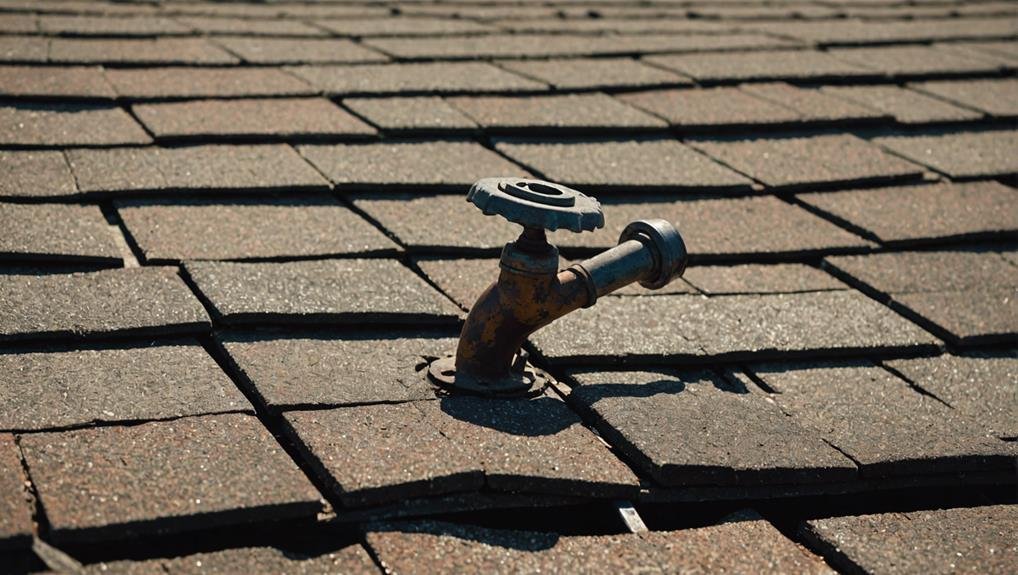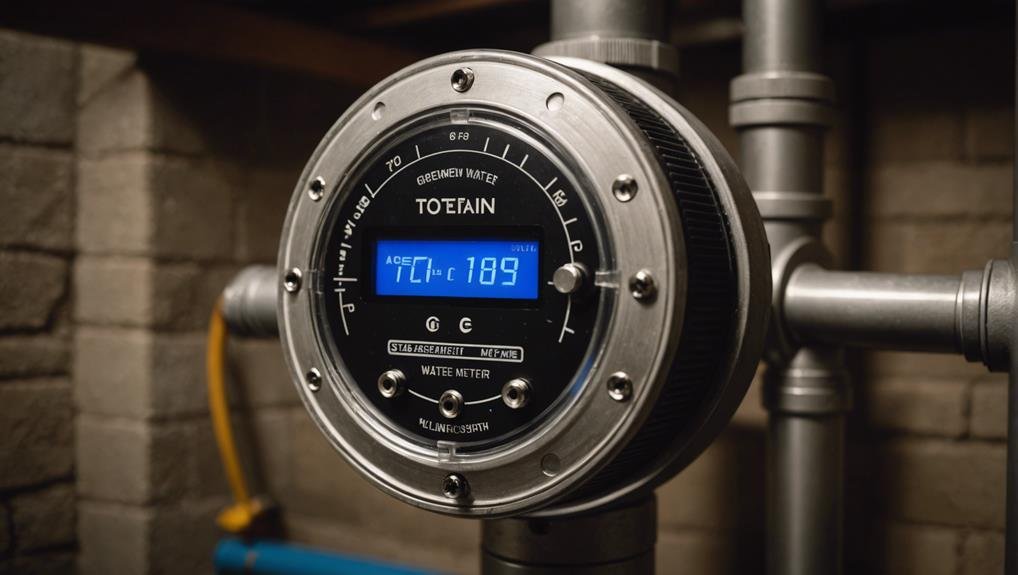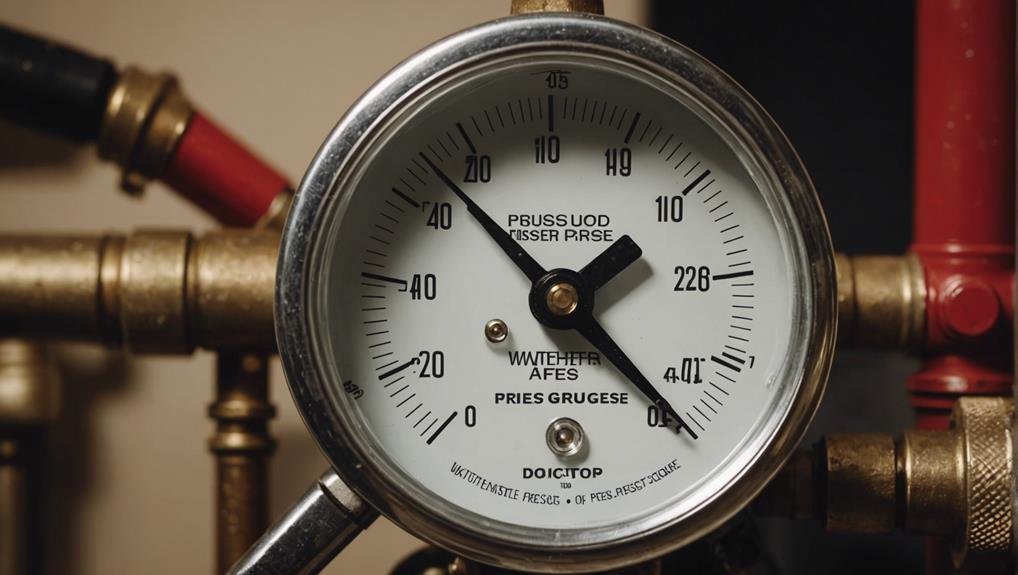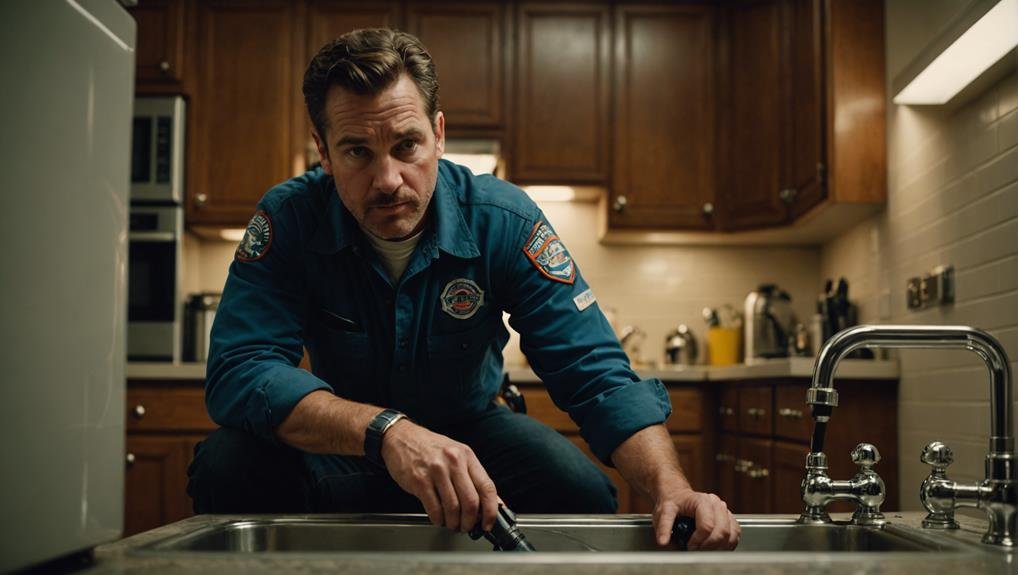To prevent leaks in the future, it's crucial to conduct regular maintenance checks and inspect plumbing fixtures for any signs of damage. By promptly replacing worn-out seals and fittings, you can address wear and tear before it leads to leaks.
Some of the links in this article may be affiliate links. If you make a purchase through these links, we may earn a small commission at no extra cost to you. Thank you.
Consider installing leak detection devices and smart water meters to catch any leaks early on. Another key step is to reduce water pressure to lessen strain on pipes and adopt water-saving habits like fixing dripping faucets right away.
Professional plumbing inspections can help catch small issues before they escalate into major problems. Monitoring your water usage can also reveal any unusual patterns that indicate hidden leaks.
By following these proactive measures, you can significantly decrease the likelihood of plumbing leaks and maintain a well-functioning system. If you need more information or recommendations, feel free to reach out for further assistance.
Regular Maintenance Checks
Regular maintenance checks are essential to prevent future leaks in our appliances and plumbing fixtures. By conducting these checks regularly, we can spot potential issues early on and address them before they turn into major problems.
Look out for signs of leaks like water stains, mold, or musty odors, as they indicate existing water damage that needs immediate attention.
Thoroughly inspect your plumbing system, including pipes, faucets, and connections, for any visible signs of corrosion, rust, or wear. These can be early indicators of a possible leak. Taking care of minor problems promptly can help avoid significant water damage in the long run.
It's important to establish a regular maintenance schedule to keep your plumbing system in top condition and free from leaks. By staying proactive with maintenance checks, you not only catch leaks early but also prolong the lifespan of your plumbing fixtures and appliances.
Inspect Plumbing Fixtures
Regularly checking plumbing fixtures is essential to catch potential leaks early on and prevent costly repairs and water damage. By inspecting faucets, sinks, and toilets for signs of leaks, loose fittings, and wear, we can address issues before they escalate.
If we notice water stains, mold, or musty odors around fixtures, it could indicate a leak. Loose fittings, worn-out seals, or corrosion should be fixed promptly to prevent leaks.
It's crucial to address dripping faucets and running toilets immediately as they not only waste water but also signal potential leaks. While we can handle simple inspections ourselves, hiring a professional plumber for a thorough check is recommended. Professionals can detect hidden leaks and ensure all fixtures are in good working condition.
Regular inspection and timely repairs help maintain the plumbing system and avoid future problems.
Address Wear and Tear

Regularly maintaining our plumbing system is crucial to preventing leaks caused by wear and tear. By routinely checking and replacing worn-out O-rings and seals in faucets and pipes, we can stop leaks before they start. It's also important to address any corrosion or damage in fittings by either tightening them ourselves or seeking professional help.
Ensuring that joints and pipes are properly sealed is essential for the overall health of our plumbing system.
Keeping an eye on under-sink areas for any signs of moisture can help us catch leaks early and prevent further damage. Monitoring and regulating water pressure is key, as high pressure can accelerate wear and tear. If we notice any corroded or damaged parts, reaching out to a professional plumber can help us avoid potential leaks and costly repairs in the future.
Here's a handy maintenance schedule to guide us:
- Check O-rings and seals every 6 months
- Tighten or replace fittings annually
- Inspect under-sink areas for moisture monthly
- Regulate water pressure annually
- Schedule a professional inspection for corrosion every 2 years
Install Leak Detection Devices
Installing leak detection devices is a smart way to protect our homes from water damage. These devices are designed to detect even the smallest leaks early on, allowing us to take action before the issue worsens. By strategically placing water leak detectors near appliances, sinks, and water heaters, we can effectively monitor these areas for any signs of leakage.
Water leak detectors are incredibly sensitive, providing us with thorough coverage and peace of mind. Placing them in multiple locations throughout our homes ensures that we can monitor all potential leak points. This proactive approach enables us to catch leaks as soon as they start, preventing costly repairs and damage.
Regularly testing our leak detection devices is essential to ensure they're functioning properly. By staying on top of maintenance, we can effectively protect our homes and prevent water damage. Investing in these devices is a small but crucial step in safeguarding our living spaces.
Use Smart Water Meters

In conclusion, incorporating smart water meters into our homes is a proactive approach to enhancing water management and preventing leaks. Devices like bluebot, a smart water meter, allow us to monitor our water usage in real-time, enabling early leak detection. These advanced meters continuously track our water consumption patterns, promptly alerting us to any leaks. By monitoring unusual spikes in water usage, we can swiftly identify and resolve potential issues before they become costly repairs.
Smart water meters not only aid in leak detection but also offer valuable insights into our water consumption habits. This data empowers us to optimize our water usage, promoting efficiency and reducing wastage. For example, if we observe higher water usage at specific times of the day, we can investigate and adjust our routines accordingly.
Furthermore, by utilizing smart water meters, significant savings on water bills can be achieved. Preventing leaks and optimizing consumption means we avoid paying for wasted water. The initial investment in a smart water meter can quickly pay off through these savings.
Fix Dripping Faucets
Fixing a dripping faucet promptly can help us save a significant amount of water annually and reduce our water expenses. Repairing a dripping faucet is often a simple do-it-yourself task that can make a big difference in water conservation and preventing future leaks.
Let's discuss how we can effectively address this issue. To begin, we should determine why the faucet is dripping, which is commonly caused by worn-out washers or O-rings. These small parts are usually easy to replace using basic tools.
Here's a straightforward process to follow: 1. Start by turning off the water supply. This step is crucial to avoid any spills or additional leaks. 2. Carefully disassemble the faucet by removing the handle and other components to reach the internal parts. Keep track of all the pieces to ensure they're reassembled correctly. 3. Inspect the washers and O-rings for any signs of wear and tear. Replace any damaged components with new ones, which can be found at hardware stores.
Reduce Water Pressure

After addressing dripping faucets, let's focus on the importance of reducing water pressure to prevent leaks and extend the life of our plumbing systems. High water pressure, especially above 60 PSI, can cause damage to pipes and fixtures, leading to costly leaks. It's recommended to set the water pressure between 30-50 PSI to prevent high pressure-related issues and keep our plumbing in top condition.
Monitoring and adjusting water pressure is crucial. By maintaining the right pressure, we can avoid water hammers, sudden pressure surges that can harm pipes. Regularly checking the pressure can save us from expensive repairs and water damage in the future.
Here's a simple guide to help:
- Below 30 PSI: Low risk, slightly increase pressure if needed.
- 30-50 PSI: Ideal pressure range, no action required.
- 50-60 PSI: Moderate risk, monitor closely.
- Above 60 PSI: High risk, reduce pressure immediately.
- Not sure: Unknown risk, seek help from a professional plumber.
If unsure how to adjust the water pressure, it's best to consult a professional. They can accurately regulate the pressure, helping to prevent leaks and maintain a durable plumbing system.
Water-Saving Habits
We can adopt water-saving habits to conserve this precious resource and prevent leaks by making simple changes in our daily routines. Promptly fixing leaks can save up to 10,000 gallons of water per year per household, preventing minor issues from becoming major problems.
Consider installing low-flow showerheads and faucets, which can save up to 2,700 gallons of water annually. These fixtures maintain pressure while using less water, making them an efficient choice for any home.
Additionally, there are more water-saving habits to consider:
- Turn off the faucet while brushing teeth to save up to 200 gallons of water per month.
- Take shorter showers to reduce water usage by up to 150 gallons per month.
- Run full loads in the dishwasher and washing machine to save up to 1,000 gallons of water per month.
Professional Plumbing Inspections

To maintain a healthy plumbing system, it's crucial to not only adopt water-saving habits but also schedule regular professional plumbing inspections. These inspections help catch small issues before they escalate into major problems, as trained plumbers can identify and repair hidden leaks that may go unnoticed.
Professional plumbing inspections are a proactive way to ensure our plumbing systems stay in good working order. Plumbers have the expertise and tools to spot issues that might be invisible to us. Early detection is key in preventing expensive repairs later on.
For example, a minor leak or a small crack left unattended could result in significant water damage and costly fixes. Investing in regular inspections can ultimately save money in the long term. Addressing potential problems early on helps avoid the need for extensive repairs and the inconvenience of unexpected plumbing failures.
Professional plumbing inspections are a wise investment in the longevity and efficiency of our home's plumbing system.
Monitor Water Usage
Monitoring our water usage regularly is crucial for detecting leaks early and preventing costly damage. An unexpected increase in our water bill can be one of the first signs of a hidden leak. By keeping a close eye on our utility bills, we can quickly identify any sudden spikes that may indicate a problem.
To enhance this monitoring process, utilizing a water monitoring device or a smart water meter can be highly effective. These tools provide real-time data on our water usage, allowing us to track it on a daily, weekly, or monthly basis. By analyzing detailed insights from these devices, we can easily spot any unusual patterns and take prompt action if something seems amiss.
There are three key steps we can follow to monitor our water usage effectively.
Firstly, it's important to review our water bills regularly and compare them to previous months. Any significant increases without a clear explanation should be investigated further.
Secondly, installing a water monitoring device can offer real-time monitoring and help in identifying leaks promptly.
Lastly, scheduling routine checks to inspect common leak areas such as sinks, toilets, and water heaters is essential in maintaining water efficiency and preventing potential damage.
Conclusion
To prevent leaks in the future, it's crucial to stay on top of maintenance checks and regularly inspect your plumbing fixtures. Taking care of any signs of wear and tear promptly, installing leak detection devices like Flo by Moen, and utilizing smart water meters such as Phyn Plus can be effective measures.
Lowering water pressure and adopting water-saving habits, such as fixing any dripping faucets and taking shorter showers, can also go a long way in preventing leaks. Additionally, scheduling professional plumbing inspections and keeping an eye on your water usage with tools like the Flume water monitor can help catch any potential issues early on.
Remember, it's much easier to prevent leaks than to deal with the consequences after they occur.

